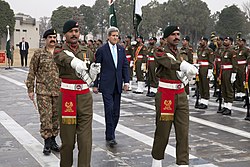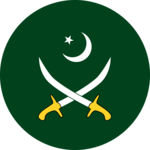General Headquarters (Pakistan Army)
| General Headquarters | |
|---|---|
| Part of Joint Staff Headquarters | |
| Chaklala, Rawalpindi, Punjab in Pakistan | |
| Coordinates | 33°36′N 73°02′E / 33.600°N 73.033°E |
| Type | HQ |
| Site information | |
| Owner | Ministry of Defense (MoD) |
| Operator | Secretariat-I Army |
| Controlled by | Chief of the General Staff |
| Open to the public | No |
| Website | |
| Site history | |
| Built | 1851 (By British Indian Army) |
| Built for | National Army HQ of Pakistan Armed Forces |
| Built by | Corps of Engineers (Construction and expansion since 1947) |
| Garrison information | |
| Current commander | Lt-Gen. Avais Dastgir |
| Designations | Army GHQ[1] |

The General Headquarters (abbreviated Army GHQ: 230 [2][3][4]) is the direct reporting and the command post of the Pakistan Army, located in the Chaklala at the vicinity of Rawalpindi, adjacent to the Joint Staff Headquarters (JS HQ).[5]
History
[edit]In 1851, the British Army in India made an permanent headquarter in Rawalpindi when Marquess of Dalhousie decided to stationed the 53rd Infantry Regiment to protect India from Afghan intervention.[6] In 1854, Robert Milman from the Diocese of Calcutta had built the city's first Garrison Church and a telegraph office.: 189 [7][6] It is also the site where Robert Milman is buried following his death in Rawalpindi in 1876.[6]
On 14 August 1947, Commander-in-Chief of the Pakistan Army General Frank Messervy decided to establish the army headquarters of the Pakistan Army at the Rawalpindi, which was also the headquarter of the Northern Command of the former British Indian Army; Gen. Messervy established it as "GHQ Pakistan", which he derived from GHQ India.[6][8][9] The Army's GHQ was viewed as a temporary post in Rawalpindi since its where Gen. Messervy was based in.: 51 [10] Since its establishment, the Army GHQ in Rawalpindi has faced many problems in civil–military relations context and criticism at broader level since the nation's capital was based in Karachi in past, and now in Islamabad.: 51 [10]: 75 [11] Until 2006, the Army GHQ's command post was based in Rawalpindi but later moved to Chaklala, near the vicinities of the PAF Base Chaklala and the JS HQ military headquarters.[10]
Since 2017, the Pakistan Army has been slowly moving its headquarters to nation's capital, Islamabad to be able to merge with the air force and the navy.[12]
Gates
[edit]| Gates | Purpose | Road | |
|---|---|---|---|
| Gate No 1 | General | ||
| Gate No 2 | Exclusively reserved for service/ex-service personnels | ||
| Gate No 3 | Exclusively reserved for families/families of martyrs | ||
| Gate No 4 | Exclusively reserved for politicians/bureaucrats | ||
| Gate No 5 | Exclusively reserved for foreign dignatries | ||
| Gate No 6 | Exclusively reserved for patients visiting CMH/Army Museum | ||
| Gate No 7 | General |
Secretariat
[edit]The Pakistan Army's GHQ is a command post of the Pakistan Army where the secretariat of the Chief of the Army Staff functions to ensure the ceremonial and operational command of the army.: 47 [10]
There are ten branches of the Pakistan Army that are headed by the lieutenant-generals and multiple administrative corps that are commanded by the director-generals who are ranked at the major-general.: 47 [10] Each of the army's branches and the director-generals of the administrative corps works under the Chief of the General Staff (CGS).[13] The chief of general staff, who usually heads the Army GHQ Staff, reports directly to chief of army staff on daily routine basis.[13]
Branches of the Pakistan Army
[edit]There are ten branches of the Pakistan Army that are headed by the lieutenant-generals and multiple administrative corps that are commanded by the director-generals who are ranked at the major-general.: 47 [10]
The Chief of Army Staff Secretariat is not considered as a part of the army branch but functions separately as an office of the chief of army staff.: 47 [10]
This article needs additional citations for verification. (January 2024) |
| Branches at the Army GHQ |
| |||||||||||||||||||||||||||||||||||||||||||||||||||||||||||||||||||||||||||||||||||||||||||||||||||||||||||||||||||||||||||||||||||||||||||||||||||||||||||||||||||||||||||||||||||||||||||||||||||||||||||||||||||||||||||||||||||||||||||||||||||
(Source: More citations needed)
|
This article needs additional citations for verification. (January 2024) |
Security
[edit]Incidents, breaches, and relocation efforts
[edit]
In 1970s, the Army's GHQ became a focal point of massive arrests and incidents of military police's baton charge on protestors when politicians Sheikh Mujibur Rahman (in 1970) and Zulfikar Ali Bhutto (in 1977) were taken into custody.: 115 [14]
The Pakistani Taliban have repeatedly attacked the headquarters. The first attack took place in 2007.[1] Others followed in 2008, resulting in Operation Janbaz; the 2008 Lal Masjid bombing; the December 2009 Rawalpindi attack; and the 2014 Rawalpindi suicide bombing.
To prevent the Taliban's repeated infiltration and to address the issue of increase security, the headquarters, together with Joint Staff Headquarters, has been slowly moving to Islamabad to integrate with the navy and air force's headquarters that are located in much safer zones of Islamabad, since 2017.[15]
See also
[edit]- Joint Staff Headquarters (Pakistan)
- Air Headquarters (Pakistan Air Force)
- Naval Headquarters (Pakistan Navy)
- Pakistan Armed Forces
- Operation Janbaz
References
[edit]- ^ a b Abbas, Hassan (October 11, 2009). "Deciphering the attack on Pakistan's Army headquarters". Foreign Policy. Foreign Policy. Foreign Policy. Retrieved 2 January 2024.
- ^ Nawaz, Shuja (2008). Crossed Swords: Pakistan, Its Army, and the Wars Within. Karachi, Sind, Pakistan: Oxford University Press. p. 655. ISBN 978-0-19-547660-6. Retrieved 30 December 2023.
- ^ Alam, Shah (2012). Pakistan Army: Modernisation, Arms Procurement, and Capacity Building. Vij Books India. ISBN 978-93-81411-20-9. Retrieved 30 December 2023.
- ^ "General Headquarters (Army)". www.ppra.org.pk. Public Procurement Regulatory Authority. Retrieved 30 December 2023.
- ^ "What an Indian saw inside the Pakistan Army headquarters". Quartz. December 7, 2018.
- ^ a b c d L. P. Sen (1 January 1994). Slender Was the Thread. South Asia Books. p. 26. ISBN 978-0861316922. Retrieved 26 April 2012.[permanent dead link]
- ^ Cloughley, Brian (2000). A History of the Pakistan Army: Wars and Insurrections. Oxford University Press: Oxford University Press. p. 435. ISBN 978-0-19-579374-1. Retrieved 2 January 2024.
- ^ Shreenivas Kumar Sinha (1992). A soldier recalls. Spantech & Lancer. p. 86. ISBN 978-8170621614. Retrieved 26 April 2012.
- ^ Eqbal Ahmad; Noam Chomsky; Carollee Bengelsdorf; Margaret Cerullo (13 June 2006). The Selected Writings of Eqbal Ahmad (1st ed.). Columbia University Press. p. 592. ISBN 978-0231127110. Retrieved 4 May 2012.
- ^ a b c d e f g Cheema, Pervaiz Iqbal (2002). The Armed Forces of Pakistan. NYU Press. ISBN 978-0-8147-1633-5. Retrieved 31 December 2023.
- ^ Nawaz, Shuja (2008). Crossed Swords: Pakistan, Its Army, and the Wars Within. Oxford University Press. ISBN 978-0-19-547660-6. Retrieved 2 January 2024.
- ^ Kashif Abbasi (2017-12-27). "Army to be allotted over 1,000 acres for new GHQ, other offices". Dawn Media Group. Retrieved 2019-07-24.
- ^ a b Alam, Dr Shah (1 July 2012). Pakistan Army: Modernisation, Arms Procurement and Capacity Building. Vij Books India Pvt Ltd. ISBN 978-93-81411-79-7. Retrieved 31 December 2023.
- ^ Khan, Gohar Ayub (2007). Glimpses Into the Corridors of Power. University of Karachi, Sind, Pakistan: Oxford University Press. p. 354. ISBN 978-0-19-547354-4. Retrieved 2 January 2024.
- ^ "Pakistan Army to get over 1,000 acres for new General Headquarters". The Economic Times. 27 December 2017. Retrieved 2 January 2024.
Further reading
[edit]- Cloughley, Brian (2000). A History of the Pakistan Army: Wars and Insurrections. Oxford University Press: Oxford University Press. p. 435. ISBN 978-0-19-579374-1. Retrieved 2 January 2024.
- Nawaz, Shuja (2008). Crossed Swords: Pakistan, Its Army, and the Wars Within. Karachi, Sind, Pakistan: Oxford University Press. p. 655. ISBN 978-0-19-547660-6. Retrieved 30 December 2023.




